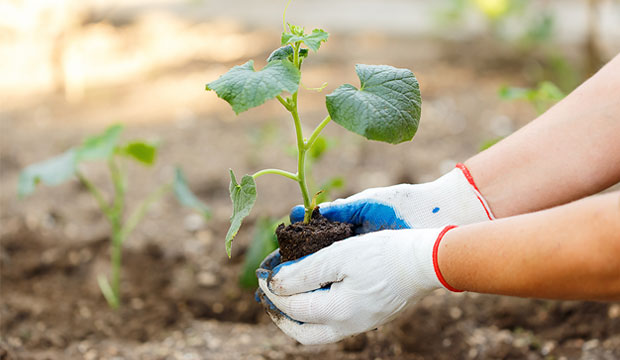The pandemic era has seen a resurgence of interest in growing, tending, and harvesting fruits and vegetables from one’s own patch of land or city balcony.
The more people are stuck at home — and the more concerned they become about their food supply — the more appealing gardening has become.
“Panic buying and food shortages caused many people to rethink their reliance on supermarkets, with a desire to become more self-reliant,” Anne Gibson, organic gardening educator and owner of The Micro Gardener, explained to the E-Commerce Times.
“With many out of work, budget is also a factor. Being able to save money by growing your own food at home means there are no food miles or fuel to get to the supermarket, no food waste or packaging costs. Ingredients can be picked fresh straight from the garden and onto the table,” she added.
The fact that in the U.S., the pandemic stay-at-home orders began during the spring enticed people to experiment with growing things, in some cases for the first time.
“If there was ever something that motivates people to garden, it’s the combination of a lot of time on your hands and springtime,” Jamie Mattikow, president and chief executive officer for W. Atlee Burpee & Co., told the E-Commerce Times.
“When people were furloughed, or in some cases let go, they went home, and suddenly they’re living with their yard in a way they’ve never lived with it before. The days started getting longer on the 19th of March, and it couldn’t have been better timing. So suddenly people are seeing their yard come to life, and that motivates people to garden.”
Gardening for Security
Home gardening also offers a sense of security and independence. Even when the world has been upended, a home garden can provide a bit of food insurance.
“I’ve noticed a surge in interest from new gardeners wanting to be more sustainable and feel empowered to learn how to grow at least some of their own food at home,” said Gibson.
“Food security and avoiding crowds by doing something positive at home have been catalysts for this surge in interest, but people are also discovering that gardening is food for the soul. Getting your hands in the soil, breathing fresh air, outdoor exercise, sowing seeds, and watching plants grow, as well as connecting with nature, do wonders for mental and physical health, too.”
Many people are finding that gardening offers a way to take control of a situation that can sometimes feel chaotic and unpredictable.
“People have turned to gardening during the pandemic for a multitude of reasons,” Agatha Hannah, director of communications and programs for the Organic Growers School, told the E-Commerce Times.
“The run for seeds was paramount to the grab for toilet paper, and it was a reaction to the very real threat of scarcity. The consequences of our industrial agriculture model became immediately apparent, as we saw a restriction in the supply chain and shortages in staple foods.
“At the same time, gardening suddenly became tangible. It can be done on any scale, and with stay-at-home orders, people are finding the time to explore this activity that they’ve likely always wanted to try,” she explained.
Green Thumb Therapy
In addition to its practical benefits, gardening offers a variety of mental and emotional benefits during a time of chaos and uncertainty.
“We believe that gardening has many mental, health, and environmental benefits,” Christie Kane, vice president of human resources & information technology for Gardener’s Supply Company, told the E-Commerce Times.
“Maintaining mental health during the COVID-19 crisis is imperative. Gardening gives people hope and a hobby. Maintaining physical health is also important. The CDC is encouraging outdoor exercise, [and] gardening gets your body moving when the gym may not be an option.”
Gardening can also be a good ‘quality of life’ activity for the family, which has become important during the pandemic.
“Gardening itself is a rewarding and joyful way to be active, to play with and to teach your children — a keen opportunity in the face of school closures — and to engage with the community by swapping knowledge, skills, and bountiful crops,” explained Hannah.
Home and Garden Renaissance
Since the garden is part of the home space where people spend so much time, the rising interest in gardening has also been part of an increased focus on home-related activities more generally.
“Home and garden brands have seen huge surges in online sales during the pandemic, not least because shoppers have been at home looking at all the improvements they could be making,” Julia Fearn, vice president of customer success for Qubit, told the E-Commerce Times.
“Additionally, making your living space nicer has been an essential part of keeping people’s moods up while the ability to go out, see friends and family, or even go on vacation has been prohibited.”
In recent months, much of the shopping for home and garden supplies has been done online, facilitated by the fact that many people have been avoiding physical retail stores and are at home to take their e-commerce home and garden deliveries.
“The other factor perhaps at play, again attributed to the fact that shoppers are at home, is that everyone can take delivery of larger items with guarantees that they will be there when the item arrives,” said Fearn. “This has forever been a challenge for home and garden brands, and most things don’t fit in the mailbox. A shopper that is always at home is more at ease buying bigger items.”
Even alternative gardening methods, such as aquaponics — which combines raising fish in tanks with growing plants in water — have seen a resurgence of interest.
“The pandemic has given a lot of people time to garden if they aren’t working and a chance to think more about our food system and whether or not the food and the quality of the food that a person wants is or will be available in the grocery store,” Rebecca L. Nelson, CEO and co-founder of aquaponics company Nelson and Pade, explained to the E-Commerce Times.
“Seeing just the beginning of food shortages made people realize that they can have more control of their own food by growing the things they like to eat. Traditional gardening has a lot of challenges that aquaponics does not.”
Aquaponics is a gardening technique well-suited to a pandemic. It allows people to raise vegetables and fish for consumption.
“Aquaponics is a sustainable method of gardening that allows a person or business to grow fresh fish and vegetables year-round,” said Nelson. “This is done without pesticides, herbicides, or chemical fertilizers. It is becoming more and more popular with gardeners who are looking for a supply of more than just vegetables. An aquaponic gardener can grow and harvest fresh fish and an abundance of salad crops.”
Gardening for the Future
Perhaps most of all, gardening is a way to provide both sustenance and a sense of well-being.
“For many Americans, this was their first glimpse into a world where some basic needs aren’t automatically met, and it struck a chord that sparked a rise in interest in self-sufficiency,” said Hannah.
“Maybe you can’t produce your own toilet paper, but nearly anyone can grow at least a portion of their own food. Folks all over the country are realizing that gardening can be done at any scale — from pots of herbs in your window to container gardening on your patio, all the way to ripping up your lawn and filling it with productive beds or pots of vegetables and flowers.”
Though it started during the pandemic, the resurgence of interest in gardening might not wane after it’s over since many people have discovered that they love the world of plants and growing.
“I think this trend is here to stay,” Hannah remarked. “The thrill of planting a seed and harvesting its fruit is deeply rewarding. Digging in the earth is tremendously therapeutic, and connecting with the soil microcosm that’s teeming with life is awe-inspiring and exciting. For most folks, it’s once a gardener, always a gardener.”

























































Gardening is my passion. I AM also gardening flowers plants I read your blog, and I AM grateful to you are inspiring me for gardening